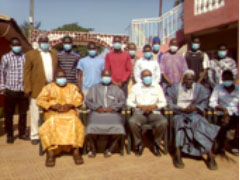
Aflasafe is a substance used to mitigate the effects of aflatoxin.
The seminar, which was held at Baobab Holiday Resort, was attended by business enterprise representatives, government officials, FAO officials and others. It targets 10 private input dealers and six extension agents who would be sensitised on the use of aflasafe in the management of aflatoxin.
The workshop aims to create awareness on the efficacy of aflasafe in aflatoxin mitigation and to encourage the involvement of the private input dealers in the importation of the product.
Upon completion, private agriculture input dealers are expected to have substantial knowledge in aflatoxin and the importance of aflasafe application. It is also expected that the importation of aflasafe products into the country would be well coordinated and maintained and availability and accessibility of aflasafe by farmers in the country is increased.
Speaking at the opening ceremony, Dr. Faye Manneh, FAO, said: “The purpose of this workshop is to sensitise you on the problem of aflatoxin and its effects on the production, trade and economy of this country and also to encourage you indulge in the importation or commercialisation of the product in the country.”
He added that this problem of aflatoxin is a problem posing a serious catastrophe to our economy, and thus, needs to be addressed now.
Bai Secka of the Agribusiness Enterprise and
a senior official of the Plant Protection Services, urged the Gambian government and concerned authorities to assist in containing aflatoxin, asserting that the private sector has been doing more than enough to ensure its mitigation.
Groundnut is one of the most important oilseed crops in The Gambia agricultural trade. It is considered an important crop by virtue of its contribution to the Gross Domestic Product (GDP) and satisfying the protein needs of many households who cannot afford animal protein.
However, production and consumption of the crop are hampered, among others, by marketing and fungal pathogen (aspergillus flavus) infection, which subsequently contaminates groundnuts with aflatoxins.
This fungus can also infect other crops such as maize, millet, sorghum, rice and cashew nut, which are highly consumed in the country. Aflatoxins are associated with acute and chronic toxicities in humans and animals causing induction of tumor, liver damage, liver cirrhosis, and other health effects.
The problem of aflatoxin contamination in groundnuts has negatively affected The Gambia in terms of both international trade and health. Some hand-picked-selected groundnut kernels (HPS) exported in recent years were either rejected or reprocessed, thereby causing loss of revenue or high costs to the country.
In recent years, The IITA and NARI through their collaborative research, recommended use of aflasafe, with the capacity to reduce the population of toxin producing ones through competition. The result of the efficacy test of aflasafe conducted country wide on groundnut showed 85% reduction of aflatoxin contamination in groundnuts.
The workshop is funded through the FAO-European Union funded project titled “Agriculture for Growth.”





